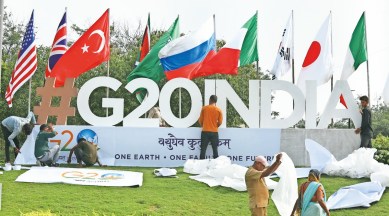Stay updated with the latest - Click here to follow us on Instagram
G20 climate meet ends with no consensus on enhanced action
While developed countries pressed for enhancement of mitigation targets from everyone, the developing countries in the group emphasised on deliveries on the unfulfilled promises related to finance and technology and urged the developed countries to do more.

Expectations from leading economies for a push for stronger climate action remained futile as the G20 Environment and Climate Ministers’ meeting in Chennai failed to reach an agreement on any language that signalled enhanced action.
The ministerial meeting, which concluded the work of the Environment and Climate Sustainability Working Group of G20, remained divided on the most crucial issues, including raising emission reduction targets and attaining the global peak of emissions by 2025.
Decisions taken at the G20 countries are no substitute for the agreements reached at the climate change conference, but because of the economic and political heft of the countries in the grouping, it can create momentum for change at the global level.
At the Chennai meeting, some countries wanted the G20 countries to agree to a commitment for a global peaking of emissions by 2025, something that was not agreeable to the developing nations. There was also a proposal to commit to global emission reductions by 60 per cent by the year 2035 from the 2019 baseline. The scientific consensus, as of now, is that countries need to cut their emissions by about 45 per cent from 2019 levels by the year 2030 to retain hopes for meeting the 1.5 degrees Celsius target.
Developing countries in the G20 group demanded that the developed world should advance their net-zero targets by ten years, and commit themselves to become carbon neutral by 2040, again a demand that was not agreeable to all.
Tripling of global renewable energy capacity, phase-down plan for unabated use of fossil fuels, reduction of non-CO2 greenhouse gas emissions like methane were some of the other issues on which countries could not find a consensus. Developing countries like India also raised concerns over the implementation of the Carbon Border Adjustment Mechanism being implemented in Europe from this year, arguing that it amounted to disguised trade barriers.